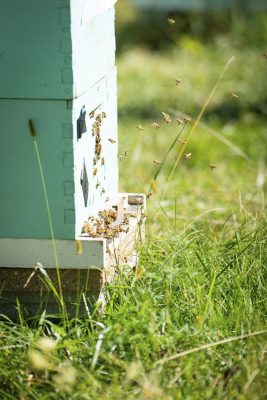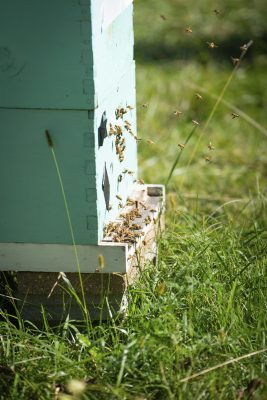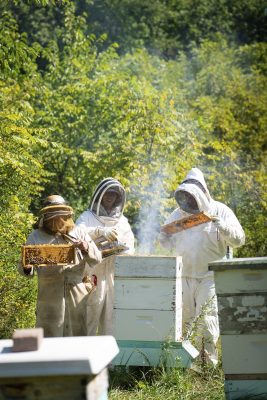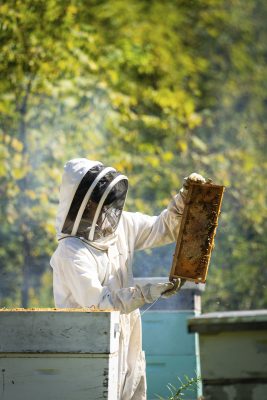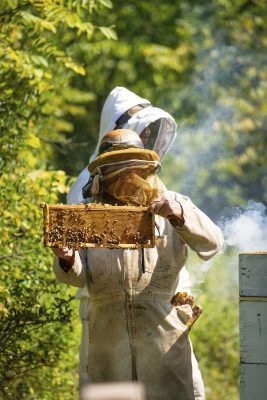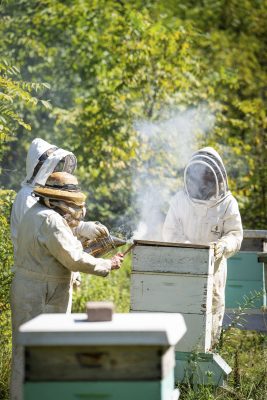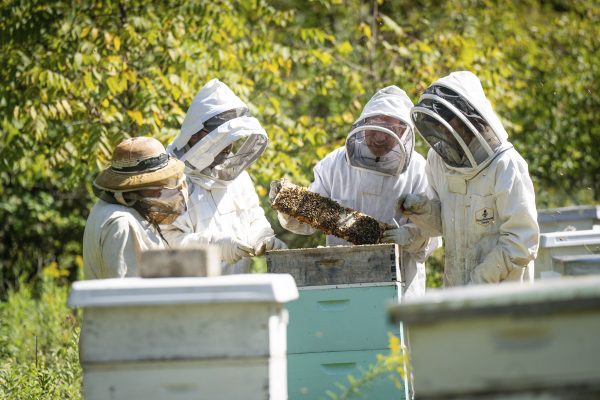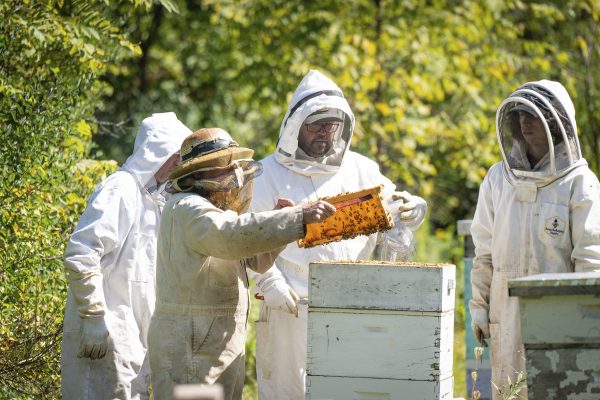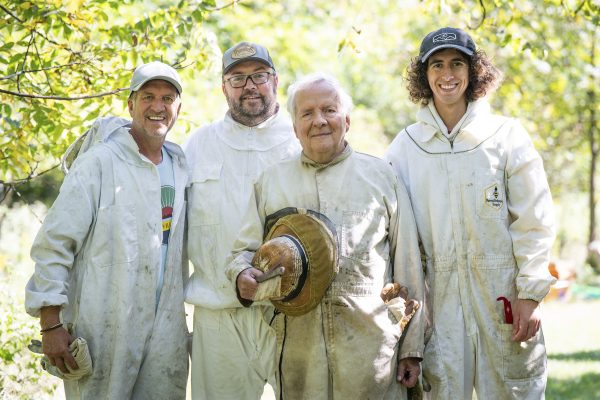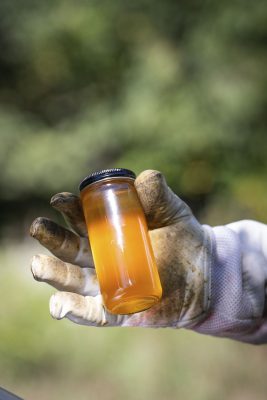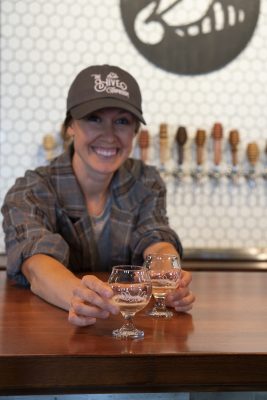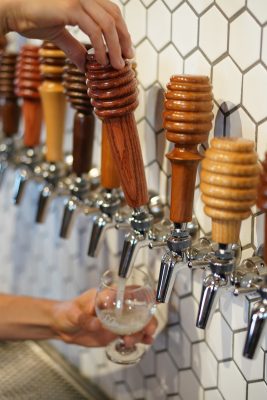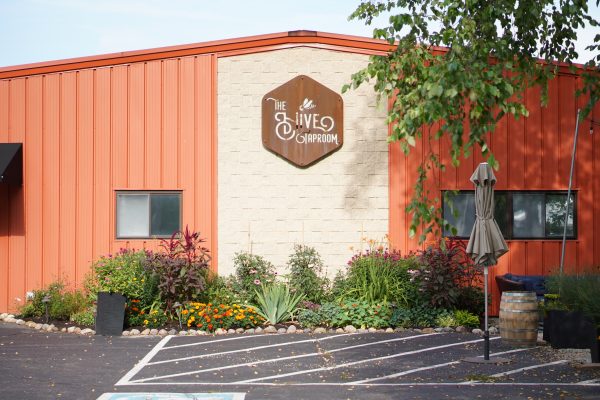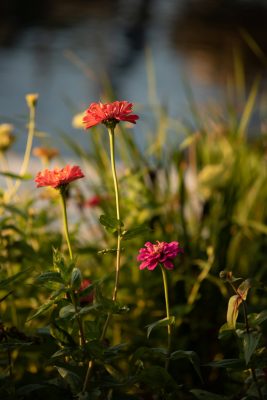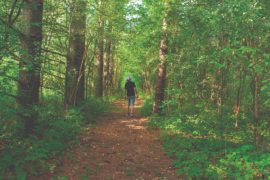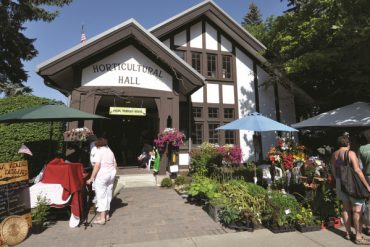By Shelby Deering | Photos by Holly Leitner
There are few activities that can actually change the world, and beekeeping is one of those pursuits. Thanks to their ability to pollinate plants, trees and bushes, bees are vital to our food supply and an irreplaceable part of the ecosystem of our world. However, bee populations have been threatened in recent years by a mysterious disease known as Colony Collapse Disorder, which some data indicates may destroy up to 50 percent of an apiarist’s hives in a given season.
This high rate of loss has made beekeeping a more important activity than ever, as apiarists must actively replace the lost colonies each year in order to keep steady the number of bees available for pollination. Luckily, there has been a surge of interest in beekeeping in the United States. The Washington Post reports that since 2007, the honeybee has been the fastest-growing livestock segment in the country. And the most recent data from the U.S. Census of Agriculture suggests that, due to this sharp rise in beekeeping, America’s honeybee population may be at an all-time high.
Locally, there are many hobbyist and small-business beekeepers working to keep the bees successfully pollinating the Geneva Lake area. These local beekeepers are doing their part to raise and maintain healthy bee colonies, which in turn provides invaluable pollination to the area’s flowers and trees. The bonus is that these beekeepers also harvest the bees’ excess honey at the end of each season, and sell it in various forms directly to local consumers.
BUZZING BEGINNINGS
Ayla Guild is a veterinarian, beekeeper and co-owner of The Hive Taproom in East Troy, a meadery she opened with her brewer husband, Tim, in 2018. Mead, an alcoholic beverage similar to cider, is made from honey. So Guild started beekeeping in order to provide the raw material for The Hive’s rotating list of meads, but also because she wanted to have more “Zen moments.”
“I wanted to harvest my own honey,” she says. “I wanted to see if I could apply my veterinary skills to make a difference and keep bees healthy. I wanted to provide more pollinators to my community. I wanted to learn more about the bees.”
In learning the art of beekeeping, Guild was mentored by Dan O’Leary of East Troy’s Honey Valley Beekeeping. Today, Guild’s hives contain as many as 70,000 bees and produce enough honey for she and her husband to brew several different varieties of dry-session meads made from 100 percent raw honey, including popular year-round flavors like Cherry Love and Pineapple Express.
Stephanie Slater, owner and apiarist at Jam Session Honey and Preserves in Elkhorn, knew little about beekeeping growing up on a Walworth County dairy farm, but that changed when she attended an Earth Day event at Elkhorn’s Gateway Technical College and listened to a female beekeeper’s presentation.
“I was so intrigued,” she remembers. “Although I no longer lived on a farm, I contemplated how I could start beekeeping. It turned out that a friend with a hobby farm outside Elkhorn wanted to host some [bee] colonies.” Slater’s business was born from that serendipity.
Beekeeping can also be a family affair, as is the case with Lake Geneva’s Klug family. There’s John Klug, the patriarch who is nicknamed “Old Master” (OM) as a nod to his many years of beekeeping experience; Marc Klug, John’s son; and Marc’s son Andrew Klug. It all started when John’s wife gave him a beehive for Christmas in 1968 — he has raised bees almost continually since then. Marc became a beekeeper shortly thereafter in 1975 at 10 years old. And Andrew became a beekeeper in 2012 at 11 years old. Family friends Nick Staggs and Johnny Packard have also been inspired to become beekeepers as a result.
“All of us have been drawn in by the pure enjoyment that beekeeping brings and the satisfaction of seeing the hives grow and thrive,” Andrew Klug says. “And of course, once you taste fresh honey, you can’t go back.”
BUSY AS A BEE
While a beekeeper’s operations may vary, Slater says that small-scale beekeepers generally inspect their colonies on a weekly basis. These inspections can include assessing the health and nutrition of the honeybees and making sure they have enough space in the hive. A beekeeper may also provide some supplemental nutrition, as well as pest and disease treatments. “Unlike cows or other livestock, honeybees don’t require daily care,” Slater points out.
Guild, of the Hive Taproom, says that she tries to open up the hives as little as possible, since it disrupts the bees’ home. She has a list of things she’s looking for when she opens a hive. Do the bees have honey? Do they have pollen? She’ll also look for signs of a healthy queen — if she sees eggs, she knows the queen has been there within the past three days. She checks developing larvae to make sure they look healthy, and she observes the adults, looking for drones (male bees) and worker bees (female bees).
But mostly, Guild explains, she prefers to observe the colonies without opening up their hives. “I watch them fly in and out of their hive and watch for [the bees] bringing back pollen,” she says. “If the hive is bringing in pollen, there’s a good chance they’re raising brood, or baby bees.”
FACING CHALLENGES
Guild is quick to point out that it’s not all sunshine when it comes to raising bees. Sometimes, even the most enthusiastic apiarists meet challenges that make beekeeping seem daunting and even heartbreaking.
John Klug experienced his “biggest challenge” in the late 1980s, when Varroa mites infiltrated his hives. These microscopic, parasitic mites feed on honeybees and destroy colonies. As a result, having the hives overtaken by mites is one of the worst things that can happen to a beekeeper. Before the mites arrived, Klug had 70 hives; after their arrival, he lost nearly all of his hives in one season. “It was a huge emotional and financial hit,” he says.
Slater knows the toll mites can take on an apiary. She says that the battle to keep mites at bay is a top priority. She has to continually work to keep the numbers of mites low throughout the year. “But we’ll never get rid of them all,” she adds.
As with all activities, there are also a lot of dull moments or tasks that require hard work. “As cool as this is, a lot of beekeeping isn’t sexy,” says Guild, of the Hive Taproom. “It’s a lot of lifting heavy boxes awkwardly and cleaning equipment. But it’s the moments that you’re out with the bees that are super memorable.”
A SWARM OF SURPRISES
Many people think beekeeping is a fairly straightforward venture, but the apiarists all point out that it can be tricky when you first get started. “It’s more than just putting some bugs in a box,” Slater explains. “It’s probably a steeper learning curve than caring for other animals. Every single year is different. By having a solid understanding of honeybee biology and behavior, a beekeeper will be able to adjust to seasonal differences.”
Marc Klug agrees, and says he has also picked up on bees’ idiosyncrasies over the years. “The bees can sense who is nervous and who is calm,” he says. “For instance, in our group, Andrew, Johnny and OM are calm, and Nick and I give off nervous energy to the bees. As a result, Nick and I are targeted more by the bees.”
Guild adds that most people are surprised to learn that honey is extracted only once a year, toward the end of the blooming season. “Therefore, our honey is a mix of everything the bees have been sampling and collecting from April until the first week of August,” she says. “Each year, our honey tastes a little different — sometimes there are more pronounced floral notes, citrus notes or mint notes.”
At The Hive Taproom, Guild and her husband use the honey they harvest to create several different flavors of mead. “I love that when you taste our session meads, you are literally tasting the results of the weather patterns,” she says. “It’s a bit space- time continuum bending when you think about it.”
HIVES WITH HEART
There’s one quality that all beekeepers seem to share: they genuinely love their honeybees and care about them deeply. It also gives beekeepers a chance to focus on an activity they enjoy while connecting with nature in a meaningful way.
“I love the Zen that comes from being in flow with the bees,” Guild explains. “Standing over an open hive lights up all your senses. You can smell the honey… You can hear the vibrations of the bees’ wings, and in the summer, you can feel the air currents that the bees are putting through the hive as they work to cool it down. Each colony has its own personality. You can feel their collective energy as they all work together to accomplish a goal. It’s really powerful. They teach me to slow down, be present, pay attention and be curious.”
Marc Klug agrees. “Working with bees is a sort of meditation … when you are inspecting a hive with 20,000 bees in it, you are only thinking of what you are doing and nothing else.”
Johnny Packard describes the practice as “therapeutic”: “You are forced to slow down, be in the moment and try to understand something that is very different from yourself.”
Slater says that her favorite activity is competing in honey shows, where apiarists enter their honey and honeycombs to be judged and ranked by experts. In 2023, Slater’s liquid honey received “Best of Show” honors at the American Honey Show hosted by the American Beekeeping Federation.
Slater also relishes the opportunities to be outdoors when she’s working with the bees. “Sunny days in June are great days to be in the apiary,” she says. “Everyone, including the bees, is happy. And extracting honey is always exciting in the fall. There’s a sense of pride when people ask for more of my honey because it’s the best they’ve ever tasted.”
Try This At Home
Beginning beekeeper? Our experts give advice.
For those interested in taking up beekeeping, Slater recommends that new apiarists join a local beekeeping association, such as the Walworth County Beekeepers Association or the Wisconsin Honey Producers Association. She stresses the importance of networking and education in the field, and points out that aspiring beekeepers can gain access to valuable resources, and form friendships along the way. Joining an association can also provide opportunities to shadow experienced beekeepers in their apiaries.
In addition, Slater advises that it’s important to understand your town, city or municipality’s ordinances (you may not be able to keep hives in your backyard, for example), and since there is a “steep learning curve in beekeeping,” as she says, new beekeepers should look for classes and conferences in January and February, long before summer arrives.
Grow a Pollinator Garden to Help the Honeybees
If you’d like to do your part to help the local honeybee population, consider planting a pollinator garden in your yard. Board member Tom Nickols of Yerkes Observatory leads a volunteer group that has been working on landscape restoration around the historic property, including the inclusion of a pollinator garden and five on-site beehives managed by a company called Bee All About, owned by Kim Kulton.
Nickols says trees and bushes are generally the first things to bloom in the spring, which may attract the earliest honeybees of the season.
“Red maples, lilacs, redbud, magnolia, lindens, willows and fruit trees are good choices,” Nickols says. “These trees provide a huge amount of pollen and nectar.” For summer blooms, he suggests planting clover, peonies, columbines and native wildflowers such as coneflowers, black-eyed Susans and asters.
Where to Buy
Your guide to finding local honey in the Lake Geneva area
If you’re dying to taste some of the delicious honey and honey-based products mentioned in this article, add these spots to your local list:
The Hive Taproom, East Troy. Owners Tim and Ayla Guild harvest their own honey to turn into delicious mead, a honey-based alcoholic beverage similar to cider. Visit the website for more info, and then stop by the tap room in East Troy to try around a dozen different flavors of mead, plus delicious zero-proof drinks made from honey as well.
Jam Session Honey and Preserves, Elkhorn. Stephanie Slater’s award-winning honey is available at Queen Bee Artisan Market in Lake Geneva. For up-to-date information on additional vendors, visit Slater’s website at awardwinninghoney.com.
Lake Geneva Honey. For the latest updates on where to buy the honey made by the Klug family (along with family friends Staggs and Packard), visit their website and sign up for the newsletter.
Locally and regionally made honey is also available at many of the local farmer’s markets and farm stands throughout the area:
- Burlington: Thursdays, 3-7 p.m. Wemhoff Square, Burlington.
- Delavan: Market at Tower Park, Thursdays, 3-6 p.m., Memorial Day through Aug. 31. Historic Tower Park, Delavan.
- Elkhorn: Saturdays on the Square, featuring local handmade products, fresh locally grown produce and food vendors. Saturdays, 9 a.m. to 1 p.m Memorial Day through Aug. 31. Veterans Park, Elkhorn.
- Lake Geneva Farmers’ Market: Local farmers and vendors offer local produce, flowers and goods. Thursdays, 8 a.m. to 1 p.m., May 1 through Oct. 31; Horticultural Hall, Lake Geneva.
- Pearce’s Farm Stand: 9:30 a.m. to 5:30 p.m. daily, mid-July through Oct. 31; W5470 North Walworth Road, Walworth.
- Whitewater City Market: Tuesdays, 4-7 p.m. Memorial Day through the end of September; 4-6 p.m. through Oct 31. Historic Train Depot, Whitewater.
- Williams Bay Farmers’ Market: Fridays, 8:30 a.m. to 1 p.m. Memorial Day through Labor Day; Edgewater Park, Williams Bay.

